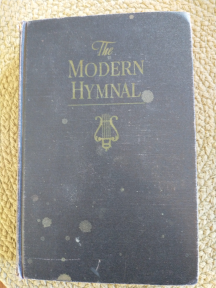The American Hymnal, with a copyright date of 1933, was published by Robert H. Coleman seven years after The Modern Hymnal. You can read about Robert H. Coleman, Publisher of Hymnals and The Modern Hymnal in other posts - see the links at the end of this article.
In many ways, these two hymnals are very similar. The covers, except for the title, are identical. The inside covers, both front and back are also the same except for the scripture verses at the top.
As was the case with The Modern Hymnal, The American Hymnal was also published during the years that B.B. McKinney served as an editor for Coleman. Perhaps he even wrote the Foreword, which is simply signed "The Editor."
And, like the earlier hymnal, this one was also reprinted after the Sunday School Board of the Southern Baptist Convention purchased Robert H. Coleman. You can see this on the title pages of the copies that I own.
One very noticeable difference is that this hymnal as The American Hymnal opens with "My Country, 'Tis of Thee" and "America, the Beautiful" as the first and second hymn before "Crown Him with Many Crowns" appears as the third hymn. The Modern Hymnal opened with "O Worship the King."
In addition to hymns by McKinney, I found this one by I.E. Reynolds, whose history is so closely intertwined with that of B.B. McKinney as a leading figure in the Southern Baptist Convention at that time. It's also notable that there were several newer hymns included whose copyright date came after the 1926 publication of The Modern Hymnal. These are noted on the title page as "a Wealth of New Songs."
I also noticed the inclusion of multiple versions of this same hymn with three different tunes.
The American Hymnal, as did the preceding hymnal and the Broadman Hymnal, 1940 which followed by just a few years, included choral anthems among it's pages. Service music was also included.
This hymnal also included a feature very familiar to the later users of The Baptist Hymnal, 1956 - The Church Covenant.
One other difference that I noticed is that the Responsive Readings have titles specifying the subject of the reading instead of the text headings that The Modern Hymnal used. The Broadman Hymnal also followed this practice.
Finally, as the others did, The American Hymnal includes a selection of indices to assist in the selection of hymns and readings for worship.
If you know and recognize this hymnal, The American Hymnal, published by Robert H. Coleman and reprinted by the Sunday School Board of the Southern Baptist Convention, I would love for you to share you memories in the Comments below.
Additional posts in the Robert H. Coleman hymnal series:
Robert H. Coleman, Publisher of Hymnals
The Modern Hymnal
Reapers Songbook
Coleman's Songs for Men
The Popular Hymnal
If you have not done so, please subscribe to my email newsletter to receive information on additional posts that are designed to encourage and inspire you. Click this link to go to the subscription page: Subscribe to Richard's Newsletter Now!
Blessings,
Richard




















































